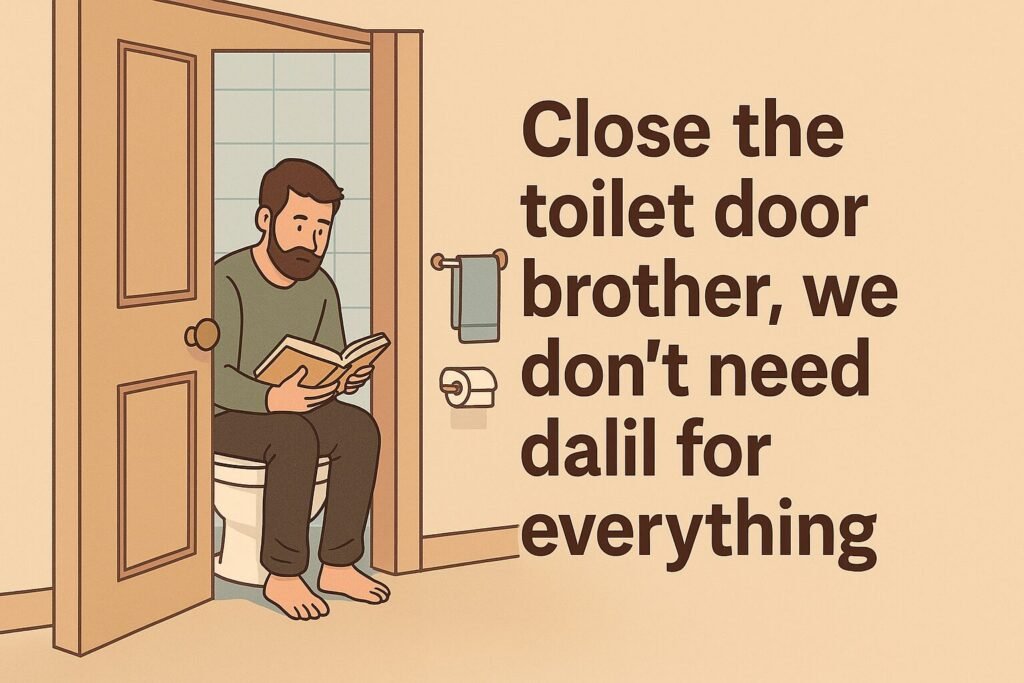Ever watched someone try to base every little action in life purely on Quran and Sunnah — to the point they forget common sense?
I just saw this hilarious TikTok (yes, yes, I still use TikTok for research) where a guy’s sitting on the toilet with a book. Door wide open. And when someone tells him to close the door, he goes, “Is there any hadith on that?”
Click here to watch the video.
Honestly.
That’s when it hit me — we sometimes get so caught up trying to self-serve Islam that we forget how fiqh works. We forget that the scholars have spent lifetimes studying context, applying wisdom, and filling in the gaps.
Because here’s the truth — not every single thing is going to be spelled out clearly in the Quran or Sunnah.
Did the Prophet (peace be upon him) ever say: “Thou shalt close the toilet door before relieving thyself”?
Of course not.
But that’s not the point.
The Wisdom Between the Lines
Islam is not just about finding an ayah or hadith for every single thing. It’s about understanding the principles behind them.
Why do we close the toilet door?
– Modesty
– Hygiene
– Respect for others
– Peace of mind (seriously, try doing your business while making eye contact with your cat)
All these are maqasid — objectives of Islamic law — that scholars have used to guide rulings for centuries.
And this is where some folks go off track. They say, “Show me the verse,” and forget that even the verse may require explanation, context, or linguistic depth that most of us aren’t trained in.
Yes, You Have a Brain. Use It With Guidance.
If Islam was only about reading a book and following it word for word, we wouldn’t need ulama (scholars). But Allah Himself reminds us to ask those who know (Surah An-Nahl 16:43).
So while it’s great to be eager and learn from the source, it’s even greater to be humble and say, “Maybe I don’t know everything. Maybe I should ask someone who does.”
Just like you’d consult a doctor for a weird rash, or a plumber when your bidet goes rogue, we need to consult scholars for spiritual and legal matters.
You know what’s worse than opening the toilet door while someone’s inside?
Being told you just disturbed a jinn.
Yup. According to some folks on TikTok, the toilet is where jinns chill — like their very own kopitiam. So if you forget to say the dua before entering, you might just end up… spiritually photobombed.
But let’s pause and ask: Is this all real? Do jinns really camp in our loos? Or are we turning religion into a horror movie?
What Islam Says About Jinn (Without the Drama)
Yes, jinn are real. The Quran mentions them in Surah Al-Jinn and elsewhere.
Yes, they exist in places humans find filthy or lonely, including bathrooms.
And yes, the Prophet ﷺ taught us to recite a specific dua before entering the toilet for protection:
> “Bismillah, Allahumma inni a’udhu bika minal khubuthi wal khabaa’ith.”
(In the name of Allah, I seek refuge in You from the male and female devils.)
But Islam doesn’t tell us to panic. It tells us to take spiritual precautions, not become paranoid.
Not Everything Is a Jinn Problem
Let’s be honest. Sometimes we blame jinn for things that are really just… us.
– Forgot where you put your phone? “Jinn moved it.”
– Got a stomachache after mee goreng and teh tarik? “Maybe kena jinn.”
– Toilet flushes by itself? “Confirm haunted.”
Come on lah.
Islam encourages us to seek knowledge, not superstitions.
We take jinn seriously, yes. But we also understand that living in fear of the unseen 24/7 isn’t healthy or Islamic.
Dua Over Drama
Instead of turning every squeaky bathroom door into a horror scene, why not focus on spiritual hygiene?
– Say the dua
– Maintain modesty
– Keep clean
– Don’t obsess over what you can’t see
Because let’s face it — if the jinn really wanted to scare us, they’d just change your phone wallpaper to your ex.
Don’t Be a DIY Mufti
We all love a bit of independence. But let’s not become DIY muftis — scrolling through random fatwa sites and stitching rulings together like spiritual patchwork.
Islam is beautiful in its balance. It allows for deep knowledge, but also simplicity in daily life. It gives space for scholars to guide, not replace the revelation, but to help us live it in today’s world.
And sometimes that guidance is as simple as: Close the toilet door, brother. We don’t need dalil for everything.


